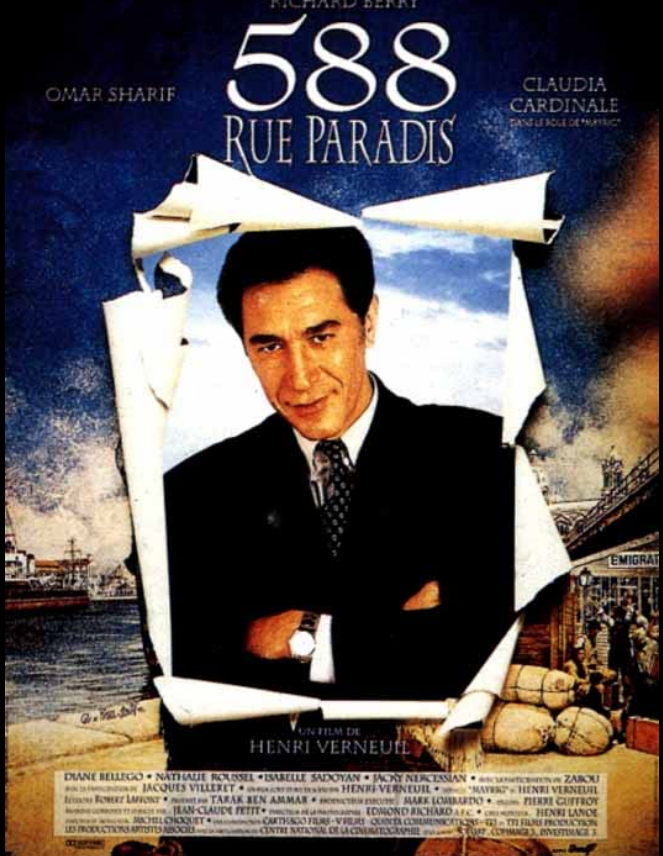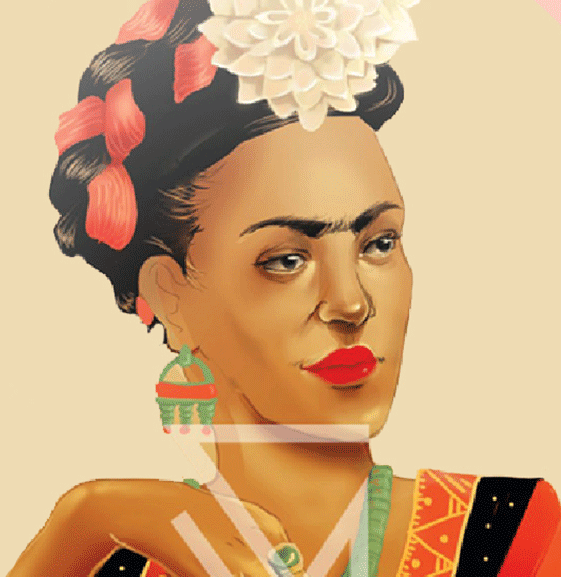|REVIEW| In the film 588, Rue Paradis, Henri Verneuil tells the story of a family fleeing the Armenian genocide. [ENG] / |RESEÑA| En Ese Camino Llamado Paraiso, Henri Verneuil cuenta la historia de una familia que huye del genocidio armeno [ESP].

588, Rue Paradis is a 1992 French drama film directed by Henri Verneuil on the subject of the Armenian genocide and the refuge that many families of that nationality found in France, specifically at the address the film refers to in its original language - French. The title refers to Rue Paradis, a street in Marseille where the protagonists live.
It is in fact a kind of autobiography of the popiographical director, who is of Armenian origin.
The film, which is excellent by any standards, was soon relegated to the subaltern cinemas, partly because the subject matter is too much of a shock to the quiet European society when it comes to genocide (this term is relatively widespread in the rest of the world, but practically ignored within Europe) and partly because of the lack of circulation and financial support of the director and the producers.
Only in France was the film relatively widely distributed. This film is the follow-up to Mayrig (1991), which suffered the same fate.
Evidently, a large part of European society is not yet ready to talk about this genocide.

The protagonist's family (Azad Zakarian, played by Richard Berry) are wealthy Armenian shipowners who manage to escape the genocide in their country by taking refuge in France, in the city of Marseille.
In their hasty flight they have had to leave behind all their material goods and wealth in their native country, so they arrive at their new destination with the only richness of their emotional strength and respect for their dignity and cultural identity.
For the first few days they are forced to live in unhealthy rooms and accommodation in apartment buildings where the inhabitants are crammed together like animals. The main one of these buildings is located at 109 Rue Paradis and this is where Azad's family ends up, played by different actors as they advance in age: Cédric Doucet is Azad at 7, Tom Ponsin is Azad at 12 and Stéphane Servais is Azad at 20.
They must start like any other immigrants from scratch in conditions of extreme poverty and discrimination, knowing that the only thing that can save them from the discomfort and desolation into which many of their peers fall, is family and roots.
"The worst evil of exiles is nostalgia for what is lost, and unfortunately for us nostalgia is a luxury," says the protagonist's father as he asks a compatriot to take him to the factory where he worked, in the hope of getting a job.
Every money earned is invested - as early as school age - in the protagonist in order to guarantee him an education similar to that of any young member of the so-called "French bourgeoisie".
As time goes by, the savings invested pay off and he manages to run a small, family-run shirt shop, in which his mother and two aunts work, located in the same street as the title but at a distance, 168 Rue Paradis, the neighbourhood is the same.
From the outset, as a young boy and later as an adult, Azad has to learn to put up with the systematic discrimination he suffers from everyone: classmates, neighbours and the odd so-called "friend".
With hard work and effort he continues studying and manages to graduate in engineering, but in reality his passion is theatre. He becomes an important director and achieves fame, social affirmation and wealth that gradually make him forget his origins and so many unfortunate people who did not have the luck and moral incentive he had to climb the social hierarchy.
He marries a woman who, ashamed of his origins, makes him change his name and surname to make them sound more French, and even deliberately tries to distance him from his family and break all ties with his past. He is thus transformed into Pierre Zakar.
All this is causing Azad/Pierre to fall into a state of alignment and he does not know where to place himself: whether in the comfort that his new social status gives him by denying his origins, or whether to return to them, losing everything he has.
At a certain point his parents are interviewed by a French magazine. His statements are considered offensive by his wife who tries to publicly mortify his mother. Remorse and respect for his parents make Azad/Pierre reconsider his identity path and the two spouses separate.
Reconciled, at peace with himself but above all with his own origins, Azad/Pierre returns to take care of his mother by giving her a house at 588 Rue Paradis, in a luxurious residence that his mother had told him as a child was similar to the one in Armenia.
When he goes on tour, his elderly mother recommends that he wear a jumper to protect him from the cold as he did when he was a child, to protect him from some "imaginary" cold.
Now he knows that this cold is associated with the desolation and grief he will feel at the loss of his mother when he returns from the tour and she - as everything makes him presume - is no longer there.

Claudia Cardinale as Mayrig
Omar Sharif as Hagop
Richard Berry as Azad Zakarian / Pierre Zakar
Diane Bellego as Carole
Zabou Breitman as Astrig Setian

Ese Camino Llamado Paraíso (588, Rue Paradis) es una película dramática francesa de 1992 dirigida por Henri Verneuil que trata el tema del genocidio armena y el refugio que muchas familias de esa nacionalidad encontraron en Francia, concretamente en la dirección a que hace referencia la película en su lengua original -francés- El título hace referencia a la Rue Paradis, una calle de Marsella donde viven los protagonistas.
Precisamente es una especie de autobiografía del popio director de origen armena.
Un poco porque el tema golpea demasiado la tranquila sociedad europea cuando se habla de genocidio (en efecto este término es relativamente difundido en el resto del mundo pero prácticamente ignorado dentro del territorio europeo) y otro poco por la esca difusión y apoyo económico que tuvieron director y productores, la película, excelente por donde se la mire, fue en seguida relegada a salas de exhibición subaltera.
Solo en Francia la película tuvo una relativa difusión. Esta película es el seguimiento de Mayrig (1991) que corrió la misma suerte.
Evidentemente una gran parte de la sociedad europea todavía no está preparada para hablar de este genocidio

La familia del protagonista (Azad Zakarian interpretado por Richard Berry), son unos acaudalados armadores de Armenia, que logran escapar del genocidio desatado en su país refugiándose en Francia, en la ciudad de Marsella.
En su huída precipitada han debido dejar todos los bienes materiales y riquezas en su país natal por lo que llegan a su nuevo destino con la única riqueza de su solidez emocional y el respeto por su dignidad y su identidad cultural.
Durante los primeros tiempos están obligados a vivir en habitaciones y alojamientos insalubres en edificios de departamentos donde sus habitantes viven hacinados como animales. El principal de estos edificios está ubicado en 109 Rue Paradis y ahí va a parar la familia de Azad, interpretado por distintos actores según avanza en su edad: Cédric Doucet es Azad a los 7 años, Tom Ponsin es Azad a los 12 años y Stéphane Servais es Azad a los 20 años
Deben partir como cualquier inmigrantes desde cero en condiciones de extrema pobreza y discriminación, sabiendo que lo único que los puede salvar del desconforto y la desolación en que caen muchos de sus similares, es la familia y sus raíces.
"El peor mal de los exiliados es la nostalgia de lo que se pierde, y por desgracia para nosotros la nostalgia es un lujo" dice el padre del protagonista al pedrile a un compatriota que lo lleve a la fábrica donde trabajó, con la esperanza de obtener un empleo.
Cada dinero ganado es invertido -ya desde la edad escolar- en el protagonista a fin de garantizarle una educación similar a de cualquier joven integrante de la llamada "burguesía francesa".
Con el pasar del tiempo los ahorros invertidos van dando sus frutos y logra tener una pequeña tienda de camisas, con conducción familiar, en la que trabajan la madre y las dos tias del protagonista ubicada en la misma calle a que hace referencia el título pero a cierta distancia, en 168 Rue Paradis, el barrio es el mismo.
Desde un primer momento, de joven y luego algo más adulto, Azad debe aprender a soportar la discriminación sistemática que sufre por parte de todos: compañeros, vecinos y algún que otro presunto "amigo"
Con denuedo y esfuerzo sigue estudiando y logra graduarse en ingeniería, pero en realidad su pasión es el teatro, se convierte así en un importante director y llega a la fama, la afirmación social y la riqueza que de a poco lo hacen olvidar de sus orígenes y de tantos desventurados que no tuvieron la suerte y el incentivo moral que tuvo él para escalar posiciones en la jerarquía social.
Se casa con una mujer que, avergonzada de sus orígenes, le hace cambiar nombre y apellido para que suenen más al estilo francés e incluso trata deliberadamente de alejarlo de su familia y de romper todo vínculo que lo una a su pasado. Se transforma así en Pierre Zakar.
Todo esto va provocando en Azad/Pierre un estado de alineación y no sabe donde situarse: si en la comodidad que su nueva condición social le da renegando de sus orígenes o si volver a ellos perdiendo todo lo que tiene.
En un cierto momento sus padres son entrevistados por una revista francesa. Sus declaraciones son consideradas ofensivas por su esposa quien trata de mortificar públicamente a su madre. El remordimiento y el respeto hacia sus padres hace que Azad/Pierre reconsidere su camino de identidad y los dos cónyuges se separan.
Reconciliado, en paz consigo mismo pero cobre todo con sus propios orígenes, Azad/Pierre vuelve a cuidar de su madre dándole una casa en 588 Rue Paradis, en una lujosa residencia que de niño su madre le había indicado que era similar a la de Armenia.
Al salir de gira, su madre ya anciana le recomienda que lleve un jersey para protegerse del frío como hacía cuando era pequeño para prtegerlo de algún frío "imaginario".
Ahora sabe que ese frío está asociado con la desolación y el desconsuelo que le producirá la pérdida de la madre cuando regrese de la gira y ella -como todo lo hace presumir- ya no esté.

Claudia Cardinale como Mayrig
Omar Sharif como Hagop
Richard Berry como Azad Zakarian / Pierre Zakar
Diane Bellego como Carole
Zabou Breitman como Astrig Setian


